A tale of two databases: the use of Web of Science and Scopus in academic papers

Web of Science and Scopus are two world-leading and competing citation databases. By using the Science Citation Index Expanded and Social Sciences Citation Index, this paper conducts a comparative, dynamic, and empirical study focusing on the use of Web of Science (WoS) and Scopus in academic papers published during 2004 and 2018. This brief communication reveals that although both Web of Science and Scopus are increasingly used in academic papers, Scopus as a new-comer is really challenging the dominating role of WoS. Researchers from more and more countries/regions and knowledge domains are involved in the use of these two databases. Even though the main producers of related papers are developed economies, some developing economies such as China, Brazil and Iran also act important roles but with different patterns in the use of these two databases. Both two databases are widely used in meta-analysis related studies especially for researchers in China. Health/medical science related domains and the traditional Information Science and Library Science field stand out in the use of citation databases.
This is a preview of subscription content, log in via an institution to check access.
Access this article
Subscribe and save
Springer+ Basic
€32.70 /Month
- Get 10 units per month
- Download Article/Chapter or eBook
- 1 Unit = 1 Article or 1 Chapter
- Cancel anytime
Buy Now
Price includes VAT (France)
Instant access to the full article PDF.
Rent this article via DeepDyve
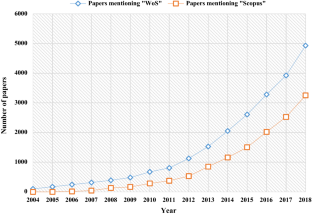
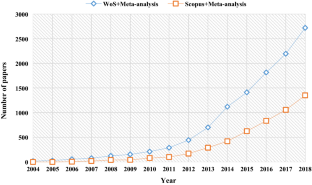
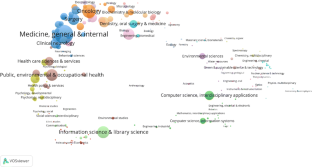
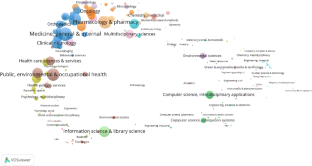
Similar content being viewed by others
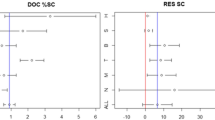
Comparison of self-citation patterns in WoS and Scopus databases based on national scientific production in Slovenia (1996–2020)
Article 06 February 2021
The journal coverage of Web of Science and Scopus: a comparative analysis
Article 19 October 2015
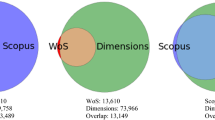
The journal coverage of Web of Science, Scopus and Dimensions: A comparative analysis
Article 26 March 2021
Notes
The search strategy used in this study is a bit different to that used by Li et al. (2018), both these two search strategies may introduce a very small percentage of records which have only mentioned some regional citation indexes such as Chinese Social Sciences Citation Index.
Although Web of Science’s topic search (search in title, abstract, author keywords and keywords plus fields) is widely used in practice, the search in the keywords plus field may introduce some noise. Besides, records which only mention the data sources in the data and methods section will also be omitted in this study.
According to Wikipedia, Scopus also has some other meanings. This study excluded these ambiguous records manually.
Two records published in 2004 are related to Scopus, however, one of them is news item and another one is editorial material which are excluded from this study.
Echoing the finding of Liu et al. (2017, 2018), a small percentage of country/region information omission is also identified. This study merges England, Scotland, Wales and North Ireland into the UK.
For information about meta-analysis, please refer to Gurevitch et al. (2018). A similar search method was also used by Guilera et al. (2013).
The decease of relative shares (columns: % within WoS/Scopus studies) in Information Science and Library Science is due to faster growth rates in some other categories where literature mentions WoS/Scopus.
References
- Abdulhayoglu, M. A., & Thijs, B. (2018). Use of locality sensitive hashing (LSH) algorithm to match Web of Science and Scopus. Scientometrics,116(2), 1229–1245. https://doi.org/10.1007/s11192-017-2569-6. ArticleGoogle Scholar
- Adriaanse, L. S., & Rensleigh, C. (2013). Web of Science, Scopus and Google Scholar: A content comprehensiveness comparison. The Electronic Library,31(6), 727–744. https://doi.org/10.1108/EL-12-2011-0174. ArticleGoogle Scholar
- Ellegaard, O. (2018). The application of bibliometric analysis: disciplinary and user aspects. Scientometrics,116(1), 181–202. https://doi.org/10.1007/s11192-018-2765-z. ArticleGoogle Scholar
- Guilera, G., Barrios, M., & Gómez-Benito, J. (2013). Meta-analysis in psychology: A bibliometric study. Scientometrics,94(3), 943–954. https://doi.org/10.1007/s11192-012-0761-2. ArticleGoogle Scholar
- Gurevitch, J., Koricheva, J., Nakagawa, S., & Stewart, G. (2018). Meta-analysis and the science of research synthesis. Nature,555(7695), 175–182. https://doi.org/10.1038/nature25753. ArticleGoogle Scholar
- Harzing, A. W., & Alakangas, S. (2016). Google Scholar, Scopus and the Web of Science: A longitudinal and cross-disciplinary comparison. Scientometrics,106(2), 787–804. https://doi.org/10.1007/s11192-015-1798-9. ArticleGoogle Scholar
- Hu, Z., Tian, W., Xu, S., Zhang, C., & Wang, X. (2018). Four pitfalls in normalizing citation indicators: An investigation of ESI’s selection of highly cited papers. Journal of Informetrics,12(4), 1133–1145. https://doi.org/10.1016/j.joi.2018.09.006. ArticleGoogle Scholar
- Jacso, P. (2018). The scientometric portrait of Eugene Garfield through the free ResearcherID service from the Web of Science Core Collection of 67 million master records and 13 billion references. Scientometrics,114(2), 545–555. https://doi.org/10.1007/s11192-017-2624-3. ArticleGoogle Scholar
- Lei, L., & Liu, D. (2019). The research trends and contributions of System’s publications over the past four decades (1973–2017): A bibliometric analysis. System,80, 1–13. https://doi.org/10.1016/j.system.2018.10.003. ArticleGoogle Scholar
- Leydesdorff, L., Carley, S., & Rafols, I. (2013). Global maps of science based on the new Web-of-Science categories. Scientometrics,94(2), 589–593. https://doi.org/10.1007/s11192-012-0784-8. ArticleGoogle Scholar
- Li, K., Rollins, J., & Yan, E. (2018). Web of Science use in published research and review papers 1997–2017: A selective, dynamic, cross-domain, content-based analysis. Scientometrics,115(1), 1–20. https://doi.org/10.1007/s11192-017-2622-5. ArticleGoogle Scholar
- Liu, W. (2019). The data source of this study is Web of Science Core Collection? Not enough. Scientometrics, 121(3), 1815–1824. https://doi.org/10.1007/s11192-019-03238-1. ArticleGoogle Scholar
- Liu, W., Ding, Y., & Gu, M. (2017). Book reviews in academic journals: Patterns and dynamics. Scientometrics,110(1), 355–364. https://doi.org/10.1007/s11192-016-2172-2. ArticleGoogle Scholar
- Liu, W., Hu, G., & Tang, L. (2018). Missing author address information in Web of Science—An explorative study. Journal of Informetrics,12(3), 985–997. https://doi.org/10.1016/j.joi.2018.07.008. ArticleGoogle Scholar
- Liu, W., Hu, G., Tang, L., & Wang, Y. (2015a). China’s global growth in social science research: Uncovering evidence from bibliometric analyses of SSCI publications (1978–2013). Journal of Informetrics,9(3), 555–569. https://doi.org/10.1016/j.joi.2015.05.007. ArticleGoogle Scholar
- Liu, W., Tang, L., Gu, M., & Hu, G. (2015b). Feature report on China: A bibliometric analysis of China-related articles. Scientometrics,102(1), 503–517. https://doi.org/10.1007/s11192-014-1371-y. ArticleGoogle Scholar
- Liu, W., Tang, L., & Hu, G. (2020). Funding information in Web of Science: An updated overview. Scientometrics, in press.. https://doi.org/10.1007/s11192-020-03362-3. ArticleGoogle Scholar
- Martín-Martín, A., Orduna-Malea, E., Thelwall, M., & López-Cózar, E. D. (2018). Google Scholar, Web of Science, and Scopus: A systematic comparison of citations in 252 subject categories. Journal of Informetrics,12(4), 1160–1177. https://doi.org/10.1016/j.joi.2018.09.002. ArticleGoogle Scholar
- Meho, L. I., & Sugimoto, C. R. (2009). Assessing the scholarly impact of information studies: A tale of two citation databases—Scopus and Web of Science. Journal of the American Society for Information Science and Technology,60(12), 2499–2508. https://doi.org/10.1002/asi.21165. ArticleGoogle Scholar
- Moed, H. F., Markusova, V., & Akoev, M. (2018). Trends in Russian research output indexed in Scopus and Web of Science. Scientometrics,116(2), 1153–1180. https://doi.org/10.1007/s11192-018-2769-8. ArticleGoogle Scholar
- Mongeon, P., & Paul-Hus, A. (2016). The journal coverage of Web of Science and Scopus: A comparative analysis. Scientometrics,106(1), 213–228. https://doi.org/10.1007/s11192-015-1765-5. ArticleGoogle Scholar
- Quan, W., Chen, B., & Shu, F. (2017). Publish or impoverish: An investigation of the monetary reward system of science in China (1999–2016). Aslib Journal of Information Management,69(5), 486–502. https://doi.org/10.1108/AJIM-01-2017-0014. ArticleGoogle Scholar
- Rousseau, R., Egghe, L., & Guns, R. (2018). Becoming metric-wise: A bibliometric guide for researchers. Cambridge, MA: Chandos Publishing. https://doi.org/10.1016/C2017-0-01828-1. BookGoogle Scholar
- Tang, L., & Shapira, P. (2011). China–US scientific collaboration in nanotechnology: Patterns and dynamics. Scientometrics,88(1), 1–16. https://doi.org/10.1007/s11192-011-0376-z. ArticleGoogle Scholar
- Tang, L., Shapira, P., & Youtie, J. (2015). Is there a clubbing effect underlying Chinese research citation increases? Journal of the Association for Information Science and Technology,66(9), 1923–1932. https://doi.org/10.1002/asi.23302. ArticleGoogle Scholar
- Wang, Q., & Waltman, L. (2016). Large-scale analysis of the accuracy of the journal classification systems of Web of Science and Scopus. Journal of Informetrics,10(2), 347–364. https://doi.org/10.1016/j.joi.2016.02.003. ArticleGoogle Scholar
- Yu, D., Xu, Z., & Wang, W. (2018). Bibliometric analysis of fuzzy theory research in China: A 30-year perspective. Knowledge-Based Systems,141, 188–199. https://doi.org/10.1016/j.knosys.2017.11.018. ArticleGoogle Scholar
- Zhang, L., Rousseau, R., & Glänzel, W. (2016). Diversity of references as an indicator of the interdisciplinarity of journals: Taking similarity between subject fields into account. Journal of the Association for Information Science and Technology,67(5), 1257–1265. https://doi.org/10.1002/asi.23487. ArticleGoogle Scholar
- Zhu, J., Hu, G., & Liu, W. (2019a). DOI errors and possible solutions for Web of Science. Scientometrics,118(2), 709–718. https://doi.org/10.1007/s11192-018-2980-7. ArticleGoogle Scholar
- Zhu, J., Liu, F., & Liu, W. (2019b). The secrets behind Web of Science’s DOI search. Scientometrics,119(3), 1745–1753. https://doi.org/10.1007/s11192-019-03091-2. ArticleGoogle Scholar
Acknowledgements
This research is supported by the National Natural Science Foundation of China (#71801189 and #71904168) and Zhejiang Provincial Natural Science Foundation of China (#LQ18G030010 and #LQ18G010005). The authors would like to thank the referee for his/her insightful suggestions which have significantly improved the manuscript.
Author information
Authors and Affiliations
- Faculty of Education, East China Normal University, Shanghai, 200062, China Junwen Zhu
- School of Information Management and Engineering, Zhejiang University of Finance and Economics, Hangzhou, 310018, Zhejiang, China Weishu Liu
- Junwen Zhu







